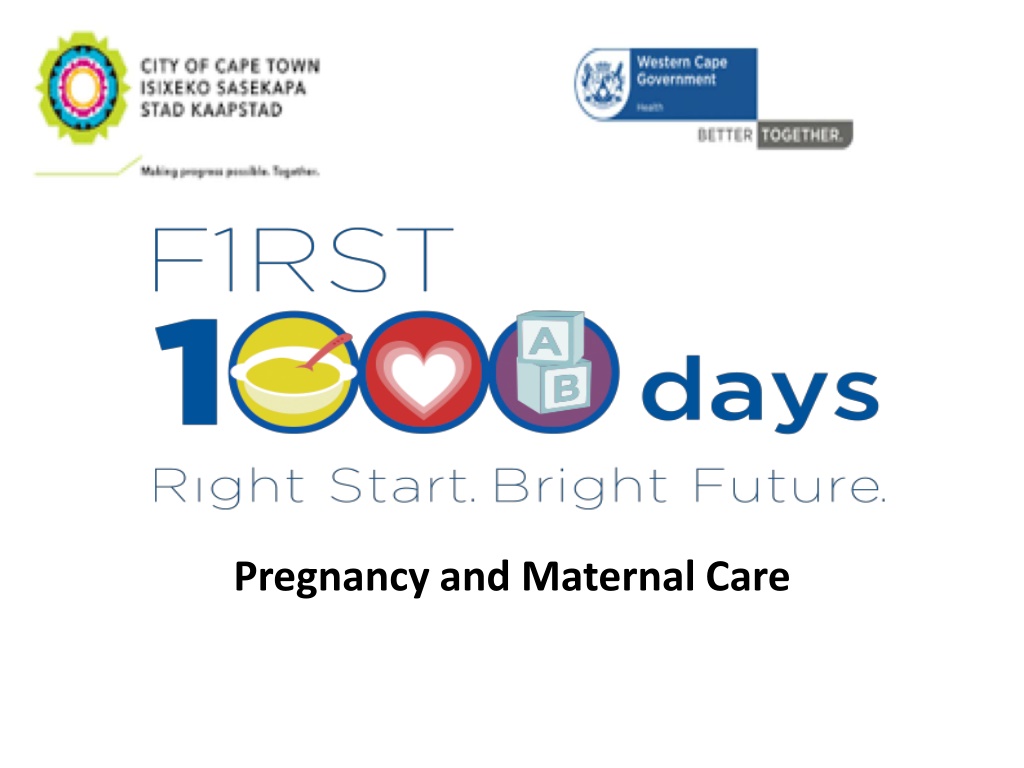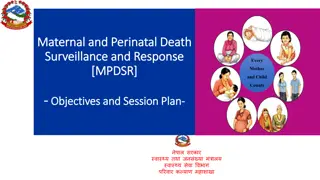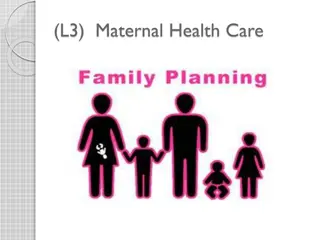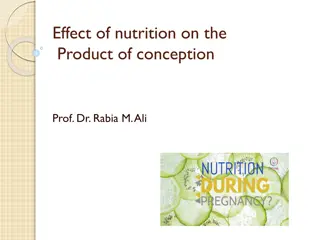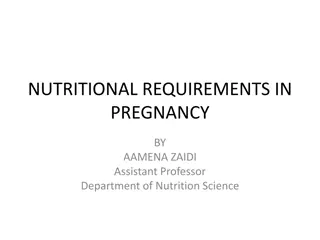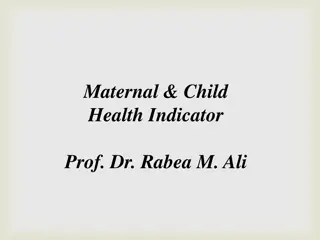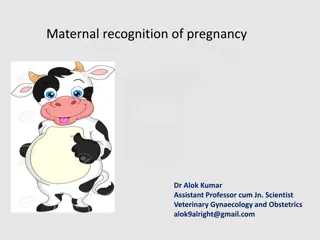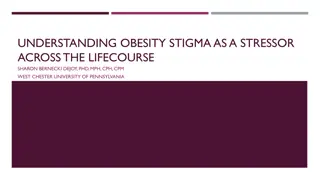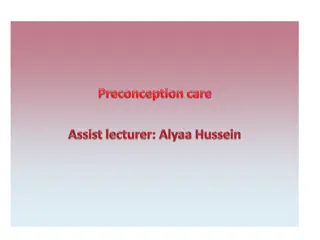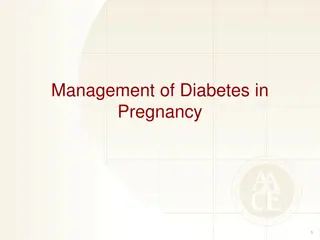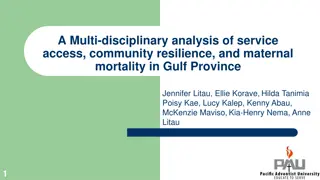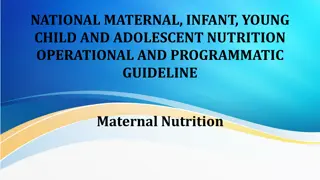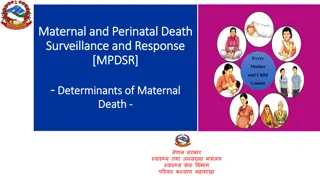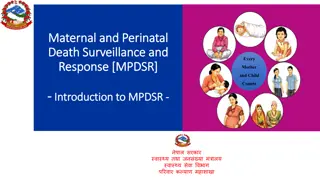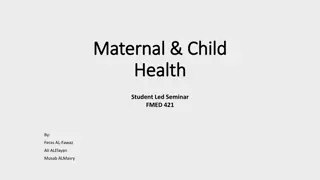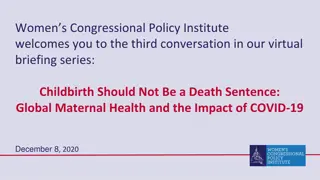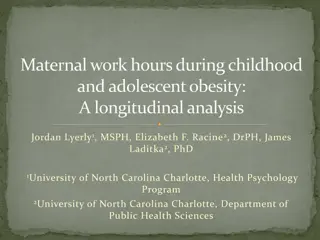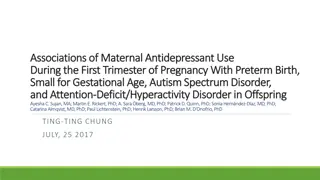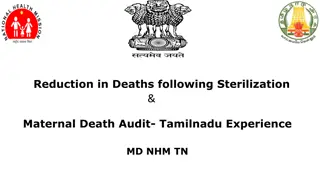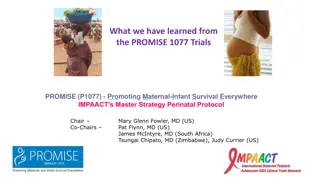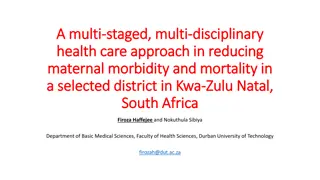Understanding Pregnancy and Maternal Mental Wellness
Video 1 highlights a young woman's journey through unplanned pregnancy, isolation, and depression, emphasizing the importance of mental health support during the perinatal period. It discusses risk factors like poverty and lack of social support, as well as protective factors such as education and a supportive partner. Video 2 explores the negative effects of stress on pregnancy and fetal development, underscoring the significance of addressing maternal mental wellness for the well-being of both mother and baby.
Download Presentation

Please find below an Image/Link to download the presentation.
The content on the website is provided AS IS for your information and personal use only. It may not be sold, licensed, or shared on other websites without obtaining consent from the author. Download presentation by click this link. If you encounter any issues during the download, it is possible that the publisher has removed the file from their server.
E N D
Presentation Transcript
Summary: Video 1 Deals with a young woman from Khayelitsha. Her pregnancy was unplanned. She finds herself isolated and depressed, with suicidal thoughts. She is lucky to attend Mowbray MOU, where she was screened as part as their Mother s Mental Health Project. She receives counselling & support and recovers well. In her testimony she emphasizes the fact that speaking to a stranger felt good and non-threatening The listening skills and advice received was very helpful. By the time she delivers her baby she is a happy and proud mother.
What is mental wellness? Not just the absence of illness, but: Social connectedness, Positive relationships, Self esteem, Resilience, Purpose in life, Personal growth, Environmental mastery, Autonomy
Risk Factors for Mental Health Problems Lifelong Poverty Domestic violence Sexual abuse Alcohol & substance abuse Stressful life experiences Physical illness Food insecurity Fragile circumstances: conflict, migration, natural disaster History of mental health problems Perinatal Period Adolescent pregnancy Unwanted pregnancy Lack of support from partner / in-laws Being unmarried Postnatal Period Abortion/miscarriage/stillbirth Infant sick, developmental problems, etc. Lack of social support Girl child
Protective Factors for Mental Health Problems Having more education Having a permanent job Having a kind, trustworthy intimate partner Companionship in labour Fisher et al, Systematic Review Bull WHO 2012
Summary: Video 2 Discusses the negative effects of stress in pregnancy. Cortisol and adrenaline ( stress hormones ) released into the maternal circulation, get to the foetus circulation. Brief exposure of the foetus to stress hormones causes no harm. Chronic exposure to stress hormones depresses the electrical activity in the areas of the joy, happiness and curiosity. Prolonged exposure to toxic stress affects the baby s brain, changing its architecture and wiring. Children from stressful pregnancies are withdrawn, cry a lot and have a more aggressive behaviour. A child that is sad, fearful and lacks curiosity does not respond to the stimulation required for full brain development
Add slide on frequency of mental health problems
Impact of Maternal Mental Health Problems Antenatal depression Poor uptake of health and social services Poor physical health & poor nutrition Substance & alcohol abuse Foetal development Birth outcomes Childhood development problems: behavioural, cognitive, motor & psychological Antenatal anxiety Pre-eclampsia Intra-Uterine Growth Retardation Preterm birth Low apgar Foetal programming effect (HPA axis) long term consequences: physical, cognitive, social, mental health Greater impact for offspring than depression? Separate and additional impact to depression ALSPAC study: Avon Longitudinal Study of Parents and Children Independent from impact of postnatal depression
Nutrition The mother s food security and nutrition choices are very important. Iron and folate micronutrient supplements are critical. Preparing for Exclusive Breastfeeding is the most natural way to foster mother-infant attachment.
How does the attachment relationship develop? The 1st connection with the world is through the body and senses Learning is optimized by the emotional warmth and safety of the interconnectedness Fathers and siblings play an important role in their love and care LOVE SAFETY 10
Implications for Services Antenatal Birth to 6 months 7 months to 2 years General Health & wellness Booking < 20weeks; 4 ANC visits; PMTCT; Educate, screen, refer problems of alcohol, tobacco, drugs; Psychosocial risk screen & mental health screen Postnatal care Effective Family Planning PMTCT Immunisations Management of disease (pneumonia /diarrhoea) Developmental screening Hand washing & hygiene Immunisations Management of disease (pneumonia / diarrhoea) Developmental screening Hand washing & hygiene De-worming Adequate nutrition Balanced diet Micronutrients Optimal weight Support Exclusive breastfeeding Growth monitoring Prevent malnutrition Breastfeeding Complementary feeding Micronutrients Growth monitoring Prevent malnutrition Supplementary feeding Breastfeeding counselling Stimulation & Support Psychosocial support Parenting information Promotion of caregiving practices Parenting information Promotion caregiving Early learning (home) Birth registration, Child Support Grant Promotion caregiving Early learning (home) Parenting information CSG
Summary of lessons learned - 1 The mother s relationship with the baby starts in pregnancy When a pregnant woman is depressed the foetus also feels sad and that affects its future growth and development 1 in 3 women in SA suffer from depression Screen pregnant women for psychosocial & mental health problems Missing maternal depression is a huge missed opportunity Pregnant women that are depressed need care Prematurity, low birth weight and various types of child development problems can be prevented
Summary of lessons learned - 2 The uterus provides the first safe and secure environment for the child to grow and develop Mothers themselves need a supportive environment to provide loving and safe care for the child Antenatal and postnatal services needs to focus on the health and well-being of both mom and baby Currently little attention is paid to the mother well-being and how she interacts with her child The mother s effectiveness as a parent depends on the support she gets from the father, extended family, employer and the community at large
Summary of lessons learned - 3 Promote early bookings Comprehensive risk assessments to identify toxic stress & refer: Mental Health problems? Substance abuse, alcohol, smoking? Food insecurity? Is counselling & social support required? Parental readiness? Map your intersectoral service departments /NGOs & refer Ensure effective family planning (birth spacing of at least 2 years) Teenagers vulnerability: stress, depression, birth complications and increased child mortality Exceptional compassion is needed towards adolescent mothers
Creating the right conditions is likely to be more effective and less costly than addressing problems at a later age It is easier to build strong children than to repair broken men. Frederick Douglas
Thank you! Acknowledgements: Simone Honikman, Janet Giddy, Elmarie Malek, Michael Hendricks, Wayne Wright (videos) Desmond Hendricks (sound)
